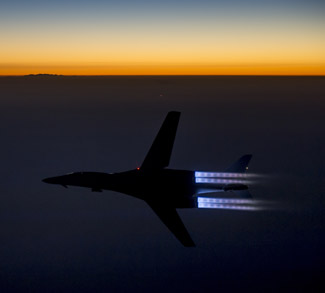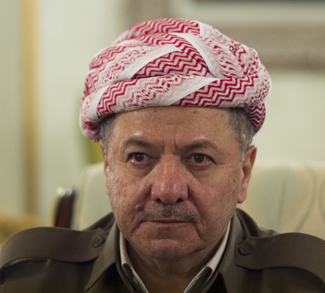Within what seems like the very bowels of the internet lies a fully functional and multifaceted propaganda arm of one of the most brutal militant groups ever seen. The so-called Islamic State (or “ISIS,” Islamic State in Iraq and Syria) is not only ruthless in person, but in its virtual presence as well.
The part of the ISIS media arm that lies closest to the ‘surface’ of the internet is the group’s Twitter usage. It has been reported that thousands of Twitter accounts suspected of being affiliated with ISIS have been identified by the Twitter team, and the US government has even requested information from Twitter on as many as 1,918 ISIS Twitter accounts in the first half of 2014. Most of these accounts, owing to Twitter’s policy against violence, have been manually suspended/deleted by Twitter admins. However, once these accounts are suspended, additional accounts suddenly appear to take their place. Most notably to the Western world, when ISIS released its propaganda film entitled “A Message to America” in which the gruesome execution of American journalist James Foley was shown, Twitter and YouTube administrators sprang into action in order to thoroughly delete all uploads of the video and prevent its further distribution. Still though, due to the nature of the worldwide web, plenty of ISIS-affiliated Twitter accounts still manage to fly under the radar and get their messages out. These accounts frequently tweet photos, video, and text glorifying and supporting ISIS’s actions. Some of these accounts even appear to belong to in-country ISIS militants themselves, often tweeting from the battlefield, Kalashnikov in hand. In more notable instances, US-based accounts have even directly threatened or ‘trolled’ the United States, such as a tweet showing a picture of the ISIS flag in front of the White House with a threatening message.
Twitter, however, is only the tip of the iceberg. Where ISIS really asserts itself online is internet forums. These message boards serve as the primary place where ISIS members (and more importantly, potential recruits) can inconspicuously communicate and distribute full-length ISIS-produced propaganda films. When terror/militant groups publish and distribute these films (as many Islamic militant groups have done, including the Taliban and Hamas), they are seeking not only to terrorize the outside world, but also to reach out to those who may wish to join the group. Because there is no independent reporting from inside Islamic State itself, these propaganda films offer a rare and exclusive glimpse into the group; and the glimpse is horrifying.
The videos usually come in the form of episodes within several different ‘series.’ Nearly every single film/episode includes at least one militant operation, suicide mission (“martyrdom operation”), IED attack, or cold-blooded killing. Each video/episode generally begins with a sermon from an imam in front of a mixed crowd of fighters and local townspeople. In the few videos that are translated into English, the sermons are fiery; they frequently agitate the audience in some way or another to wage jihad against any and all of the elements perceived to be opposed to the goals of Islamic State. A special focus is placed on the most immediate ‘threats’ to ISIS: the Shiite and Christian minorities of Iraq and Syria (including the militaries of both Assad in Syria and Maliki in Iraq, which are both largely Shia), the various Kurdish factions, and the less-defined takfiris, whom Sunni Islamic doctrine defines as deviators from what it sees as “true” (Sunni) Islam, and thus are deemed enemies. Militants are often shown rummaging through the personal belongings of their dead enemies, excitedly showing items to the camera such as Christian crosses or Shia pamphlets with Iranian Supreme Leader Ayatollah Khamenei superimposed on them. The result is the powerful ideological justification of organized and rampant terrorist operations that transcend the longstanding international border between Iraq and Syria; consuming considerable swathes of territory within the two countries and allowing ISIS to take on its current appearance of a sovereign state. As one translated video titled The End of Sykes-Picot demonstrates, the ideological and geopolitical aims of ISIS are inspired by Medieval Islamic history; the Islamic Caliphate. In other words, what ISIS seeks to do is recreate the Islamic Empire(s) of old, which at its height extended eastward from Arabia into what is now Pakistan, and as far westward as southern Spain. In a segment titled “Live the Cause,” supplemented by background audio of English sermons given by the late American jihadist Anwar al-Awlaki, Islamic State clearly explains to the outside world that it seeks “the transcendence of the Caliphate from words/theory to action and real-world results.” What we have here is the most basic explanation of Islamic State’s own geopolitical goals and narrative.
The videos are often violent and sadistic, with footage of operations ranging from drive-by highway shootings of what appear to be random civilian vehicles, to the rounding up and summary execution of both combatant captives and regular unarmed civilians. Apart from its seemingly random and brutal treatment of unarmed civilians, Islamic State also displays an ability and willingness to attack military targets. Iraqi and Syrian military checkpoints are often attacked using drive-by ambushes with small arms, roadside IEDs, or suicide missions using trucks filled with tons of explosives. There are even segments where Islamic State militants, disguised by the use of captured Iraqi Army uniforms and equipment, conduct raids on the homes of senior Iraqi officers in the dead of night.
Perhaps even more frightening still is how such acts of violence are mixed in with scenes of average townspeople assembling in ISIS-occupied towns to meet their new ‘government.’ Women, children, and the elderly all appear amongst members of Islamic State, and for the most part they don’t seem distressed at all. Among propagandist portrayals of various ‘hearts and minds’ efforts by Islamic State, one segment of interest involves an assembly of about 60-70 children from “emigrant families” that appear to be ethnic Malays. The children, whose ages range from about 2 to 12 years old, are shown reciting verses from the Qur’an. The young girls shown are all in hijab (headscarf), and some are even in full niqab (full burka showing only the eyes). Fighting-age South Asian men, some apparently the fathers of the children, also appear among the Arab fighters, all brandishing assault rifles. It is of interest to note here that translated ISIS media is always sure to be translated into languages such as Indonesian/Malaysian, Bosnian, Urdu (Pakistan), and Chechen; all Islamic-majority nations from which non-Arab foreign jihadists have traditionally originated.
It is rather unsettling to know that people from all over the world are ‘emigrating’ to the Islamic State, including people from Western countries, as has been well documented. It is well known to Western intelligence services that foreign fighters are a key element of ISIS, and indeed these foreigners are also heavily featured in the group’s propaganda productions. The example of the use of a man with a British accent in the executions of James Foley and Steven Sotloff comes to mind. Some videos feature these foreigners participating in military actions against ISIS adversaries, including a white Canadian man called Abu Muslim al-Canadi, who reveals he is a Muslim convert who “left his family and life of luxury and kufr (un-Islamic culture) to perform jihad for the sake of Allah.” Notably, often appearing in the beginning of videos that feature large-scale military operations is well-known and experienced ISIS commander Abu Omar al-Shishani. Al-Shishani (“the Chechen,” in Arabic) is usually shown gathered around other senior militants planning the forthcoming operation, sometimes even using Google Earth.
Taken together, these propagandist elements create an intimidating virtual presence that does not seem like it will be disappearing anytime soon. More videos are released all the time, and Islamic State has no doubt made its virtual presence felt across the globe, far beyond its physical reach.




